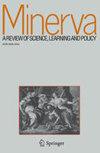不赴约就医的决定因素:一种混合方法
IF 3.2
2区 哲学
Q1 EDUCATION & EDUCATIONAL RESEARCH
引用次数: 0
摘要
本研究采用混合方法分析了不赴约就诊的决定性因素。对 200 名患者进行了调查,并辅以半结构化访谈,深入探讨缺勤背后的原因。逻辑回归分析结果显示,交通问题和预约等候时间过长是影响缺诊的主要因素。年龄、性别、忘记预约、工作原因、对医疗服务不满意、健康状况改善和受教育程度等变量都不是重要的预测因素。该研究的局限性包括样本量较小,且没有考虑患者的治疗类型。未来的研究应侧重于增加样本量和开展纵向研究,以评估特定干预措施的有效性。本文章由计算机程序翻译,如有差异,请以英文原文为准。
Determinant factors of non-attendance to medical Appointments: a mixed-methods approach
This study analyzes the determinant factors of non-attendance to medical appointments through a mixed-methods approach. A survey was conducted with 200 patients, supplemented by semi-structured interviews to delve deeper into the reasons behind absenteeism. The logistic regression analysis results showed that transportation problems and long waiting times for appointments are the main factors influencing non-attendance. Variables such as age, gender, forgetting the appointment, work-related reasons, dissatisfaction with medical care, improvement in health status, and education level were not significant predictors. The study's limitations include the small sample size and the lack of consideration of patients by treatment type. Future research should focus on increasing the sample size and conducting longitudinal studies to evaluate the effectiveness of specific interventions.
求助全文
通过发布文献求助,成功后即可免费获取论文全文。
去求助
来源期刊

Minerva
Multiple-
CiteScore
5.20
自引率
4.30%
发文量
26
期刊介绍:
Minerva is devoted to the study of ideas, traditions, cultures and institutions in science, higher education and research. It is concerned no less with history than with present practice, and with the local as well as the global. It speaks to the scholar, the teacher, the policy-maker and the administrator. It features articles, essay reviews and ''special'' issues on themes of topical importance. It represents no single school of thought, but welcomes diversity, within the rules of rational discourse. Its contributions are peer-reviewed. Its audience is world-wide.
 求助内容:
求助内容: 应助结果提醒方式:
应助结果提醒方式:


